-
ORIGINAL ARTICLE09-06-2024
Adherence to sepsis protocol in a high-risk maternity reference center
Revista Brasileira de Enfermagem. 2024;77(4):e20230453
Abstract
ORIGINAL ARTICLEAdherence to sepsis protocol in a high-risk maternity reference center
Revista Brasileira de Enfermagem. 2024;77(4):e20230453
DOI 10.1590/0034-7167-2023-0453
Views0See moreABSTRACT
Objective:
To describe the adherence to the sepsis protocol by obstetric nurses in the obstetric triage of a high-risk maternity reference center.
Methods:
This was a quantitative, documental, and retrospective study involving 105 pregnant women treated in obstetric triage under sepsis criteria. Data were collected through electronic medical records using structured forms and were organized into tables employing descriptive statistics. This research adhered to ethical principles concerning human studies.
Results:
Of the checklists for initiating the SEPSIS protocol by obstetric nurses, 105 were identified. Regarding the protocol steps performed, lactate was collected in 97.1% of cases and blood cultures in 98.1%, antibiotic therapy was administered in 94.3%, and hydration was carried out in 51.4% of the cases.
Conclusion:
The initiation of the sepsis protocol for all women meeting the criteria was confirmed. However, the steps were not fully implemented as recommended by the institutional protocol, and the recommended broad-spectrum antibiotic was not administered.
-
ORIGINAL ARTICLE09-06-2024
Physical and psychological changes of the COVID-19 infodemic by the older adult population
Revista Brasileira de Enfermagem. 2024;77(4):e20230339
Abstract
ORIGINAL ARTICLEPhysical and psychological changes of the COVID-19 infodemic by the older adult population
Revista Brasileira de Enfermagem. 2024;77(4):e20230339
DOI 10.1590/0034-7167-2023-0339
Views0See moreABSTRACT
Objective:
to analyze the physical and psychological changes of the COVID-19 infodemic for the older adult population of Rio de Janeiro.
Method:
a cross-sectional, web-based survey to find out about access to news and information about COVID-19 among older adult in Rio de Janeiro, between July and December 2020. Univariate analysis and bivariate analysis were carried out using non-parametric statistical methods.
Results:
390 older adults took part, predominantly female (75.1%), aged between 66 and 75 (35.4%), married (51.0%), white (60.3%), owning their own home (81.8%), located in urban areas (91%), with complete or incomplete primary education (31.8%) and retired or pensioners (79.2%). Younger people were significantly affected both physically and psychologically by social networks when compared to television (<0.001).
Conclusion:
Physical and psychological changes from exposure to information about COVID-19 have affected the lives of the older adult, having an impact on this population.
-
ORIGINAL ARTICLE09-06-2024
Nursing Process implementation in a gerontogeriatric context: qualitative research
Revista Brasileira de Enfermagem. 2024;77(4):e20230465
Abstract
ORIGINAL ARTICLENursing Process implementation in a gerontogeriatric context: qualitative research
Revista Brasileira de Enfermagem. 2024;77(4):e20230465
DOI 10.1590/0034-7167-2023-0465
Views0See moreABSTRACT
Objective:
to describe Nursing Process implementation in a faith-based senior living community.
Method:
strategic action research with 19 nursing professionals and three managers of a faith-based senior living community. Implementation took place in four phases: diagnosis, planning, implementation and assessment. The data collected through semi-structured interviews and focus groups were subjected to discursive textual analysis.
Results:
the central categories were constructed: Nursing Process in faith-based senior living community: diagnosis of knowledge and application; Nursing Process in faith-based senior living community: implementation; Nursing process in faith-based senior living community: assessment after its implementation.
Conclusion:
Nursing Process implementation made it possible to structure work management/organization, contributing to knowledge, organization and continuity of care for safety and professional support.
-
ORIGINAL ARTICLE09-06-2024
Development and content validation of a risk classification instrument
Revista Brasileira de Enfermagem. 2024;77(4):e20230502
Abstract
ORIGINAL ARTICLEDevelopment and content validation of a risk classification instrument
Revista Brasileira de Enfermagem. 2024;77(4):e20230502
DOI 10.1590/0034-7167-2023-0502
Views0See moreABSTRACT
Objective:
Develop and validate the content of an instrument for patient risk classification in emergency services of Primary Health Care.
Method:
The study included two stages: item generation and content validity. A literature review and retrospective analysis of medical records were conducted to create the instrument items. The Content Validity Ratio (CVR) was used to assess agreement among judges during content validation.
Results:
In the first and second rounds, 75 and 71 judges validated the risk classification instrument, respectively. The minimum adherence score for the latent variable item based on the final number of judges was 0.22 and 0.18; thus, 52 items, divided into three classification categories (red, orange, and yellow), were retained.
Conclusion:
The instrument was considered valid regarding clarity, relevance, pertinence, and agreement regarding the severity indicated in the item.
-
REVIEW08-30-2024
Impact of financial toxicity on adults with cancer during the COVID-19 pandemic: an integrative review
Revista Brasileira de Enfermagem. 2024;77:e20240078
Abstract
REVIEWImpact of financial toxicity on adults with cancer during the COVID-19 pandemic: an integrative review
Revista Brasileira de Enfermagem. 2024;77:e20240078
DOI 10.1590/0034-7167-2024-0078
Views0See moreABSTRACT
Objectives:
to identify the repercussions of financial toxicity on the lives of adult cancer patients during the COVID-19 pandemic.
Methods:
an integrative review was conducted using the PubMed, Web of Science, Scopus, and Embase databases, as well as the Virtual Health Library portal, in March 2023.
Results:
out of 62 studies found, 13 were included for analysis. The primary repercussions of financial toxicity included difficulties in covering basic expenses such as food, housing, medication, transportation, and internet access; increased anxiety and concerns related to health and financial situations; reduction or absence of income; challenges in obtaining treatment or accessing healthcare services; rising expenses; and telemedicine as a less burdensome alternative.
Conclusions:
the pandemic has exacerbated financial toxicity; therefore, healthcare teams must recognize it as an adverse event of oncological treatment and understand its potential to affect various aspects of patients’ lives.

-
ORIGINAL ARTICLE08-30-2024
Risk of smoking cessation treatment dropout: a cohort to help (re)think care
Revista Brasileira de Enfermagem. 2024;77:e20230537
Abstract
ORIGINAL ARTICLERisk of smoking cessation treatment dropout: a cohort to help (re)think care
Revista Brasileira de Enfermagem. 2024;77:e20230537
DOI 10.1590/0034-7167-2023-0537
Views0See moreABSTRACT
Objectives:
to evaluate the relative risk of smoking cessation treatment dropout during its intensive phase.
Methods:
a retrospective and quantitative cohort study was developed from the electronic medical records of individuals who started smoking cessation treatment between 2015 and 2019 at a specialty clinic in a city in the interior of São Paulo, Brazil. The relative risk of dropping out of treatment was calculated using the Poisson regression model.
Results:
it was observed that out of the 396 (100.0%) individuals who started the treatment, 109 (27.5%) abandoned it before the end of the intensive phase. For each one-year increase in age, the risk of dropping out of smoking cessation treatment decreased by an average of 2%.
Conclusions:
the risk of dropping out of smoking cessation treatment is higher among younger individuals. It is necessary to rethink the care offered to younger adults to promote the continuity of treatment.

-
08-30-2024
Fatores determinantes para à hesitação vacinal contra a COVID-19 em brasileiros: estudo utilizando modelagem de equações estruturais
Revista Brasileira de Enfermagem. 2024;77:e20240112
Abstract
Fatores determinantes para à hesitação vacinal contra a COVID-19 em brasileiros: estudo utilizando modelagem de equações estruturais
Revista Brasileira de Enfermagem. 2024;77:e20240112
DOI 10.1590/0034-7167-2024-0112
Views0See moreRESUMEN
Objetivos:
investigar los factores que influyen en la vacilación ante la vacuna contra la COVID-19 entre los brasileños.
Métodos:
esta investigación empleó un enfoque observacional y analítico, utilizando una encuesta en línea. La recolección de datos se llevó a cabo en 2020 y el análisis de los datos se realizó utilizando el modelado de ecuaciones estructurales.
Resultados:
la prevalencia de la vacilación ante la vacuna fue del 27,5% (1182 individuos). Existe una correlación negativa entre la creencia en teorías de conspiración y la influencia social. Entre las diversas creencias asociadas con las intenciones de vacunación, solo las creencias en conspiraciones mostraron un valor predictivo significativo. Así, los resultados sugieren que las creencias personales impactan significativamente la vacilación ante la vacunación y también indican que la confianza en los órganos gubernamentales está inversamente relacionada con la vacilación.
Conclusiones:
la vacilación ante la vacuna emerge como un fenómeno multifacético influenciado por una amplia gama de factores, incluyendo las creencias personales, la confianza en los órganos gubernamentales y los sistemas de salud.
-
ORIGINAL ARTICLE08-30-2024
Factors associated with university students’ knowledge about HIV and pre- and post-exposure prophylaxis
Revista Brasileira de Enfermagem. 2024;77:e20240092
Abstract
ORIGINAL ARTICLEFactors associated with university students’ knowledge about HIV and pre- and post-exposure prophylaxis
Revista Brasileira de Enfermagem. 2024;77:e20240092
DOI 10.1590/0034-7167-2024-0092
Views0See moreABSTRACT
Objectives:
to analyze the factors associated with university students’ knowledge about HIV and pre- and post-exposure prophylaxis.
Methods:
a cross-sectional study was conducted with 503 university students from a southern state in Brazil; data were collected using a characterization tool and a questionnaire containing 16 statements about the topic; descriptive measures and Poisson regression models with robust variance were used for analysis.
Results:
the prevalence of adequate knowledge (i.e., scoring more than 12 correct answers) was 27.83%; students older than 24 years, enrolled in health-related courses, who had not engaged in sexual relations in the last quarter, with a history of rapid HIV testing, and who knew or had heard about the prophylaxes showed a higher likelihood of scoring more than 12 correct answers.
Conclusions:
generally, the knowledge of young people about HIV and its prophylaxes was found to be inadequate and influenced by sociodemographic, educational, and behavioral factors.

-
01-01-2016
Nursing care in Specialized HIV/Aids Outpatient Services
Revista Brasileira de Enfermagem. 2016;69(3):515-521
Abstract
Nursing care in Specialized HIV/Aids Outpatient Services
Revista Brasileira de Enfermagem. 2016;69(3):515-521
DOI 10.1590/0034-7167.2016690314i
Views1See moreABSTRACT
Objective:
to analyze the discourses about the care provided by nurses operating in Specialized HIV/Aids Outpatient Services in four public institutions of the city of Fortaleza, Ceará, Brazil.
Method:
descriptive and exploratory study with a qualitative approach, which used as a method the discourse analysis.
Results:
when titling the “care as negative”, such title came from the analogy proposed by Freud (1912) with the photographic negative, represented by what that care can configure from the unconscious movement, since nurses did not perceive themselves in the care actions developed by supporting the work of other occupational categories, contributing to maintain the ideology of biomedicine.
Conclusion:
it is necessary to justify and theorize a nursing clinical practice from epistemological issues of the profession, in such a way that nurses can understand their relevance within the care provided.
-
RESEARCH01-01-2017
Guide of attributes of the nurse’s political competence: a methodological study
Revista Brasileira de Enfermagem. 2017;70(3):526-534
Abstract
RESEARCHGuide of attributes of the nurse’s political competence: a methodological study
Revista Brasileira de Enfermagem. 2017;70(3):526-534
DOI 10.1590/0034-7167-2016-0483
Views0See moreABSTRACT
Objective:
To build and validate a guide of attributes of the nurse’s political competence.
Method:
Methodological research. This study comprised the construction of the instrument through literature review; experts validation of pre-established attributes for composing the guide; and clinical validation in the nurses work environment/reality. The data collection took place in the months from August to October 2014, and the analysis was based on the content analysis of Bardin and use of Epi info 3.5. All ethical precepts have been complied with.
Results:
From 29 attributes found in the literature, 25 have been validated by experts. Clinical/practical validation involved the participation of 43 nurses, who observed that the attributes are not articulated with the professional practices developed by them.
Conclusion:
The attributes of the nurse’s political competence were identified with support of literature. It is concluded that the professionals still have limited and fragmented perception of political competence, expressing difficulty/limitation.
-
ORIGINAL ARTICLE06-16-2021
Direct cost of Peripherally Inserted Central Venous Catheter insertion by nurses in hospitalized adults
Revista Brasileira de Enfermagem. 2021;74(2):e20190663
Abstract
ORIGINAL ARTICLEDirect cost of Peripherally Inserted Central Venous Catheter insertion by nurses in hospitalized adults
Revista Brasileira de Enfermagem. 2021;74(2):e20190663
DOI 10.1590/0034-7167-2019-0663
Views0See moreABSTRACT
Objectives:
to analyze the average direct cost of PICC insertion by nurses.
Methods:
this is a unique case study with a quantitative approach. The observation took place in a public hospital, collecting information on inputs used and procedure length. For the calculation of costs, time was multiplied by nurses’ costs plus supplies. The US dollar was used to present the calculations. In the analysis, descriptive statistics of measures of central tendency and variability were used.
Results:
the sample corresponded to 139 observations. The average cost of PICC insertion totaled US$286.04, with 90.8% of materials, mainly catheter, and 9.2% of the labor. The procedure took an average of 50 minutes, at US$0.26 per minute for nurses. Conclusions: the average direct cost of PICC insertion was US$286.04, with emphasis on the catheter. The results can support management decisions for adequate material and professional sizing.
-
REVIEW02-06-2023
Elements for assistance to patients with hematological malignancies to propose care lines: a scoping review
Revista Brasileira de Enfermagem. 2023;76(2):e20220152
Abstract
REVIEWElements for assistance to patients with hematological malignancies to propose care lines: a scoping review
Revista Brasileira de Enfermagem. 2023;76(2):e20220152
DOI 10.1590/0034-7167-2022-0152
Views0See moreABSTRACT
Objectives:
to identify the elements for assistance to patients with hematological malignancies to propose a care line.
Methods:
this is a scoping review, anchored in the JBI theoretical framework, with searches carried out in April 2021, in eight electronic databases and 10 repositories of theses and dissertations.
Results:
the final sample consisted of 93 studies, and the main forms of assistance provided that can support a care line for this public were imaging tests, immunophenotyping, chemotherapy regimens, radiotherapy, infection management, assessment of nutritional status, maintenance of oral function, symptom management and screening for second malignancies.
Conclusions:
the elaboration of a care line for onco-hematologic patients is necessary, considering the complexity surrounding the diagnosis and treatment of hematologic malignancies, in addition to the difficulties that are imposed in relation to access and continuity of care in the network.
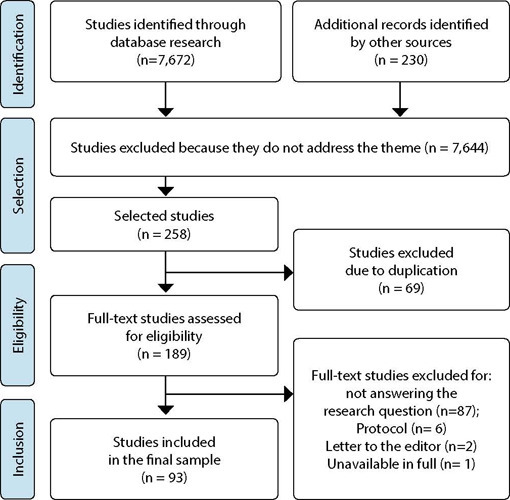
-
ORIGINAL ARTICLE03-27-2023
Prevalence of characteristics associated with sarcopenia in elders: a cross-sectional study
Revista Brasileira de Enfermagem. 2023;76(2):e20220209
Abstract
ORIGINAL ARTICLEPrevalence of characteristics associated with sarcopenia in elders: a cross-sectional study
Revista Brasileira de Enfermagem. 2023;76(2):e20220209
DOI 10.1590/0034-7167-2022-0209
Views0See moreABSTRACT
Objectives:
to identify the prevalence and characteristics associated with sarcopenia in elders in Primary Health Care Units.
Methods:
cross-sectional study with 384 elders. To evaluate sarcopenia, we measured: strength and muscle mass, and physical performance. The elderly were classified as having: probable sarcopenia; sarcopenia; or severe sarcopenia. The chi-squared test and the multinomial logistic regression method were used.
Results:
the prevalence of probable sarcopenia was 25.52%; of sarcopenia, 11.98%; and of severe sarcopenia, 9.90%. Probable sarcopenia is 1.75 times more prevalent in men; osteoporosis is 2.16 times more prevalent in people with severe sarcopenia; polypharmacy is 1.57 times more likely in individuals with probable sarcopenia; and calf circumference below 31 cm is 2.24 times more likely in patients with sarcopenia and 2.19 times more likely in patients with severe sarcopenia.
Conclusions:
the highest prevalence was of probable sarcopenia, and the characteristics associated with sarcopenia were sex, osteoporosis, polypharmacy, overweight, obesity, and calf circumference.
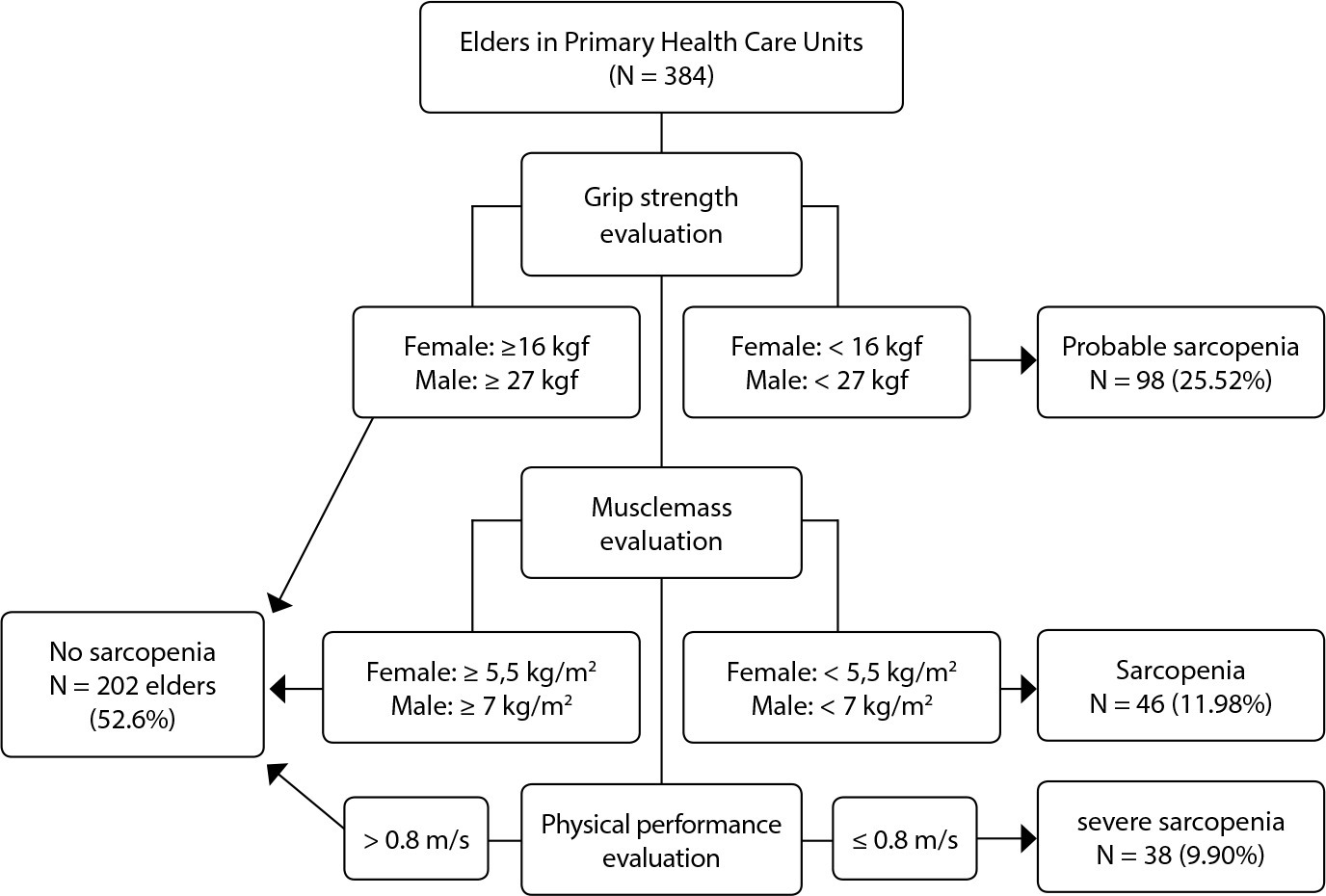
-
ORIGINAL ARTICLE10-09-2023
Independent and combined effects of lifestyle behaviors on adolescent health-related quality of life
Revista Brasileira de Enfermagem. 2023;76(4):e20220780
Abstract
ORIGINAL ARTICLEIndependent and combined effects of lifestyle behaviors on adolescent health-related quality of life
Revista Brasileira de Enfermagem. 2023;76(4):e20220780
DOI 10.1590/0034-7167-2022-0780
Views0See moreABSTRACT
Objective:
To investigate the independent and combined effects of lifestyle behaviors, including physical activity, sedentary behavior, sleep duration and food intake, in the health-related quality of life (HRQoL) of Brazilian adolescents.
Methods:
Cross-sectional school-based study, with the participation of 306 adolescents aged 14 to 18 years. A questionnaire was applied with structured questions to collect lifestyle behaviors data. Perception of the HRQoL was identified using the Kidscreen-27. The study used covariance analysis and linear regression models for statistical analysis.
Results:
Adolescents who reported ≤ 2 hours/day of screen-based sedentary behavior and sleep duration equivalent to 8-10 hours/night presented significantly higher HRQoL. Adolescents who reported joint adherence ≥ 3 healthy lifestyle behaviors demonstrated approximately two [OR=2.12] to three times [OR=3.04] more chance of presenting higher perceptions of HRQoL.
Conclusion:
Although healthy lifestyle behaviors had a positive independent effect on HRQoL, joint adherence to healthy behaviors enhances the cumulative effect.

-
ORIGINAL ARTICLE12-04-2023
Assessment of the components of sarcopenia and quality of life perceived of individuals on hemodialysis
Revista Brasileira de Enfermagem. 2023;76(6):e20220677
Abstract
ORIGINAL ARTICLEAssessment of the components of sarcopenia and quality of life perceived of individuals on hemodialysis
Revista Brasileira de Enfermagem. 2023;76(6):e20220677
DOI 10.1590/0034-7167-2022-0677
Views1See moreABSTRACT
Objectives:
to evaluate the prevalence of sarcopenia in individuals aged 50 years or older on hemodialysis; to verify the association between sarcopenia and sociodemographic, clinical, anthropometric factors, components of sarcopenia and quality of life (QoL); and to correlate the components of sarcopenia with QoL.
Methods:
Participated 83 individuals on hemodialysis. Sarcopenia was established according to the current European consensus. Dynamometry to determine strength, calf circumference (CC) and appendicular skeletal muscle mass index (ASMMI) to obtain muscle mass and gait speed (GS) for physical performance. For QoL used the WHOQOL-bref.
Results:
the prevalence of sarcopenia was 32.6% (CC) and 18.1% (ASMMI). There was no association between sarcopenia and QoL. Both handgrip strength (r=0.25) and GS (r=0.36) showed a correlation with physical domain.
Conclusions:
sarcopenia was expressive, and the aspects of functionality determine the physical impairment in this population.
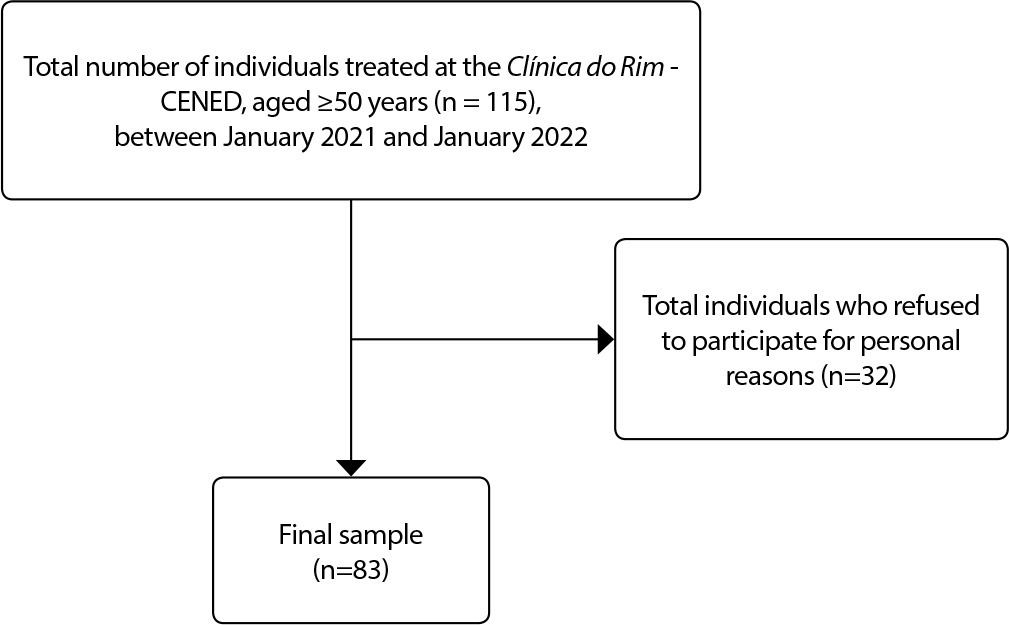
-
12-04-2023
Sleep quality of nurses who worked in coping with COVID-19: an integrative review
Revista Brasileira de Enfermagem. 2023;76(6):e20230007
Abstract
Sleep quality of nurses who worked in coping with COVID-19: an integrative review
Revista Brasileira de Enfermagem. 2023;76(6):e20230007
DOI 10.1590/0034-7167-2023-0007
Views0See moreABSTRACT
Objective:
to analyze sleep quality of nurses who worked coping with COVID-19 in scientific evidence.
Methods:
an integrative review, carried out in seven databases, including studies between December 2021 and June 2022, without language restrictions. The sample consisted of 15 primary studies.
Results:
nurses working in hospital, intensive care, outpatient care and teaching institutions constitute a vulnerable group for sleep disorders: latency, duration, efficiency and quality. The disorders identified involved insomnia at varying levels of severity: daytime dysfunction and morning sleepiness. Night work and low capacity for self-care were determinants of impaired sleep patterns.
Final considerations:
the COVID-19 pandemic contributed to greater vulnerability of nurses to changes in sleep, requiring strategies for risk management and well-being promotion.

-
ORIGINAL ARTICLE07-13-2020
Awareness raising workshop for nursing students on the elderly with Alzheimer’s disease: contributions to education
Revista Brasileira de Enfermagem. 2020;73:e20190021
Abstract
ORIGINAL ARTICLEAwareness raising workshop for nursing students on the elderly with Alzheimer’s disease: contributions to education
Revista Brasileira de Enfermagem. 2020;73:e20190021
DOI 10.1590/0034-7167-2019-0021
Views1See moreABSTRACT
Objective:
To describe the contribution of an awareness-raising workshop for nursing students on Alzheimer’s disease in the context of the elderly/family.
Methods:
Strategic action-research developed with 15 university students from the sixth to the eighth semester of Nursing at a university institution in the Rio Grande do Sul. The data collected through semi-structured interviews, before and after an awareness-raising workshop on Alzheimer’s disease in elderly/family, were subjected to thematic content analysis.
Results:
Six categories were identified that concern (Mis) perception of Alzheimer’s disease in the context of elderly/ family, from the characterization; risk factors; diagnosis; treatment of Alzheimer’s disease; from care to family members/caregivers; and care strategies for the elderly with Alzheimer’s disease.
Conclusion:
The awareness-raising workshop enabled the students to broaden and deepen the knowledge on the theme of Alzheimer’s disease in the elderly.
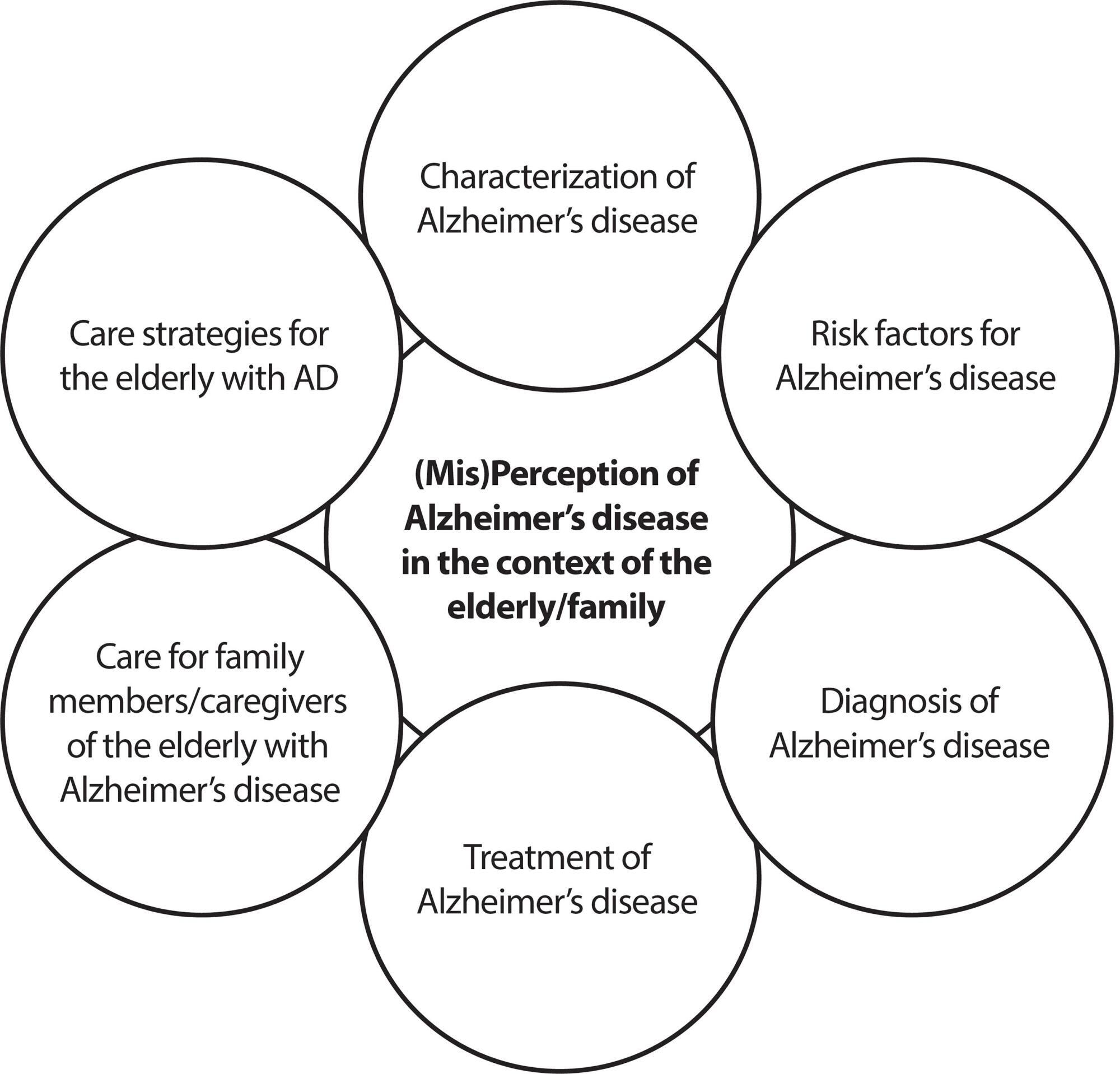
-
ORIGINAL ARTICLE09-23-2022
Analysis of the concept of cardiovascular risk: contributions to nursing practice
Revista Brasileira de Enfermagem. 2022;75(4):e20210803
Abstract
ORIGINAL ARTICLEAnalysis of the concept of cardiovascular risk: contributions to nursing practice
Revista Brasileira de Enfermagem. 2022;75(4):e20210803
DOI 10.1590/0034-7167-2021-0803
Views0See moreABSTRACT
Objectives:
to analyze the concept of cardiovascular risk to support nursing practice.
Methods:
this is an analysis to define the concept of cardiovascular risk, through the use of eight steps of Walker’s and Avant’s framework, using a literature review in indexed scientific journals.
Results:
cardiovascular risk is defined in a broad and original way as a context of health and nursing care that makes it possible to identify modifiable (cardiometabolic, behavioral, psychosocial, cultural and occupational) and non-modifiable (biological) risk factors for cardiovascular diseases that act as early and interrelated markers, of multiple and heterogeneous etiology, predisposing to cardiovascular vulnerability.
Conclusions:
with the analysis and definition of the concept of cardiovascular risk, we realized that it will be possible to base nursing practice, with implications in clinical practice for identifying and reducing risk factors for cardiovascular diseases, with nursing relevance in the care of these subjects.
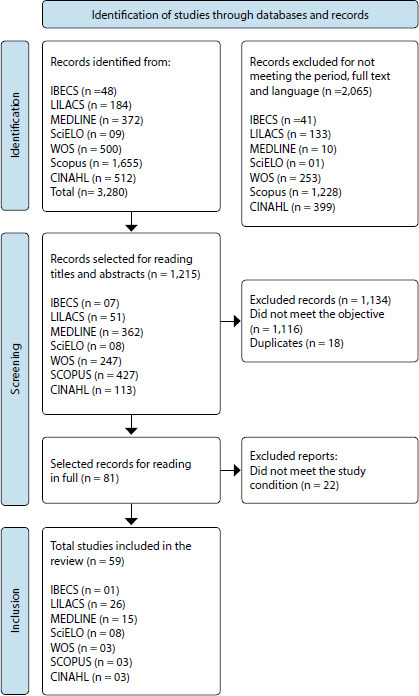
-
REFLECTION11-11-2020
Children with special needs in health: challenges of the single health system in the 21st century
Revista Brasileira de Enfermagem. 2020;73:e20190037
Abstract
REFLECTIONChildren with special needs in health: challenges of the single health system in the 21st century
Revista Brasileira de Enfermagem. 2020;73:e20190037
DOI 10.1590/0034-7167-2019-0037
Views0See moreABSTRACT
Objective:
Reflect on the gaps in the care of Children with Special Needs in Health that demand complex clinical care with dependence on technological support for the maintenance of life, in the Unified Health System.
Methods:
This is a reflection study based on recent policies and literature related to the theme.
Discussion:
Despite the advances achieved with the Unified Health System with regard to access to health services and the expansion of Primary Care, with the aim of reorienting health, it can be said that the health care model for CSHCN in Brazil is still centered on the hospital and medical knowledge.
Final considerations:
There are gaps in the policies for children aimed at the new paediatric profile, and little is discussed about its implications for the Unified Health System.
-
ORIGINAL ARTICLE10-21-2019
Being an institutionalized elderly person: meaning of experiences based on Heidegger’s phenomenology
Revista Brasileira de Enfermagem. 2019;72(6):1632-1638
Abstract
ORIGINAL ARTICLEBeing an institutionalized elderly person: meaning of experiences based on Heidegger’s phenomenology
Revista Brasileira de Enfermagem. 2019;72(6):1632-1638
DOI 10.1590/0034-7167-2018-0763
Views0See moreABSTRACT
Objective:
Analyze the meaning of being an elderly person living in a long-term institution.
Method:
Qualitative study based on Martin Heidegger’s thought. Twelve phenomenological interviews were conducted with people aged over 60 years living in a long-term institution for the elderly in the city of Itabuna, Bahia, Brazil.
Results:
The units of meaning identified were: experience of progressive loss of autonomy and independence, perception of living in an institution as an inevitable circumstance; and being-with becoming being-alone/being-lonely. After the identification of ontic aspects and hermeneutical understanding, the unit of meaning was constructed: meaning of being an elderly person living in a long-term institution.
Final considerations:
The ontological needs referring to being an elderly person remain forgotten. As we are ontic and ontological, limited care to the ontic instance indicates deficiencies in institutionalization. Improvements are required to ensure the right to age with quality of life to this population.
-
ORIGINAL ARTICLE09-21-2020
Adaptive problems arising out of the progenitor’s abandonment after Zika Congenital Syndrome
Revista Brasileira de Enfermagem. 2020;73:e20190602
Abstract
ORIGINAL ARTICLEAdaptive problems arising out of the progenitor’s abandonment after Zika Congenital Syndrome
Revista Brasileira de Enfermagem. 2020;73:e20190602
DOI 10.1590/0034-7167-2019-0602
Views0See moreABSTRACT
Objective:
to reveal the adaptive problems of the woman abandoned by the child’s parent after Congenital Zika Syndrome, in the light of Roy’s Adaptation Model.
Method:
a qualitative, descriptive study, based on Roy’s Adaptation Model, developed with six women abandoned by their child’s parent after Zika Congenital Syndrome diagnosis, through interview and Content Analysis technique.
Results:
adaptive problems appeared in nutrition, activity, rest, and protection patterns, due to limitations in self-care; self-concept, related to dissatisfaction with body image and personal being; in the role of transition role, through difficulties in taking over new roles and in interdependence, related to changes in affective needs.
Final considerations:
the overload of care for children with Congenital Zika Syndrome, added to the challenges of the abandoned woman by her child’s parent, led to adaptive problems, showing their main difficulties of coping.
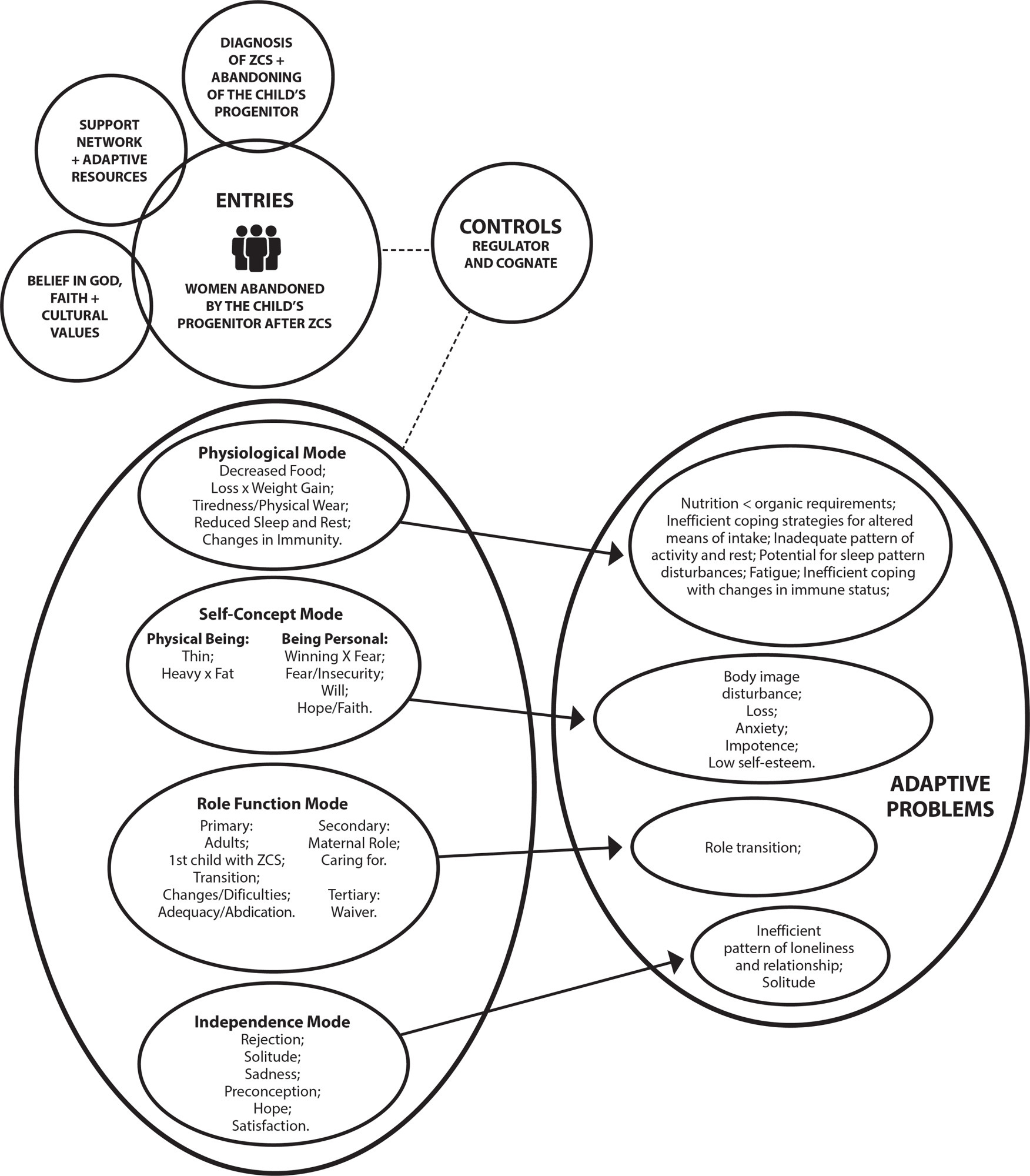
-
REVIEW04-16-2021
Nursing assistance in patient care with external ventricular drain: a scoping review
Revista Brasileira de Enfermagem. 2021;74(2):e20190796
Abstract
REVIEWNursing assistance in patient care with external ventricular drain: a scoping review
Revista Brasileira de Enfermagem. 2021;74(2):e20190796
DOI 10.1590/0034-7167-2019-0796
Views0See moreABSTRACT
Objectives:
to map the available evidence about nursing care aimed at adult patients using external ventricular drain.
Methods:
this is a review using the scoping review method.
Results:
Initially, 965 studies were identified and, after the eligibility criteria, a sample of 54 publications was obtained. Each of them was assessed according to GRADE, resulting in three studies with high quality; 14 with moderate quality; 32 with low quality; and five with very low quality. It was highlighted 20 nursing care subdivided into nine categories, namely: drainage system; bed positioning and mobilization; catheter care; monitoring of intracranial pressure; and medication administration.
Conclusions:
the scoping review made it possible to identify the main nursing care directed to adult patients undergoing placement of external ventricular drain from the evidence available to date.

-
ORIGINAL ARTICLE10-21-2019
Multidisciplinary team actions of a Brazilian Psychosocial Care Center for Alcohol and Drugs
Revista Brasileira de Enfermagem. 2019;72(6):1624-1631
Abstract
ORIGINAL ARTICLEMultidisciplinary team actions of a Brazilian Psychosocial Care Center for Alcohol and Drugs
Revista Brasileira de Enfermagem. 2019;72(6):1624-1631
DOI 10.1590/0034-7167-2018-0760
Views0See moreABSTRACT
Objective:
to investigate the criteria used by health professionals to identify the phase of consumption of alcohol and drug users, and actions directed to their care.
Method:
a qualitative study developed with 14 professionals from a Brazilian Psychosocial Care Center for Alcohol and Drugs (Centro de Atenção Psicossocial Álcool e Drogas) based in the south of the country. Data were collected in June 2017 through semi-structured interviews and then submitted to thematic analysis.
Results:
the criteria used by the professionals were: periodicity of use; amount and type of drug used; repercussions of misuse; and place that the drug occupies in the person’s life. The actions developed were orientation and referral to support groups, therapeutic workshops and individual care.
Final considerations:
the chronic nature of alcohol/drug use/dependence requires specific care in each phase, and objective criteria to identify and intervene in early phases, aiming at the prevention of chemical dependence.
-
06-11-2021
Resilience in elderly people: factors associated with sociodemographic and health conditions
Revista Brasileira de Enfermagem. 2021;74:e20200171
Abstract
Resilience in elderly people: factors associated with sociodemographic and health conditions
Revista Brasileira de Enfermagem. 2021;74:e20200171
DOI 10.1590/0034-7167-2020-0171
Views0See moreABSTRACT
Objective:
to describe the sociodemographic and health characteristics of elderly people, measure the score of total resilience and by sex and verify the association of sociodemographic and health variables with total resilience and by sex.
Methods:
this is a household survey with 808 elderly people, assessed by validated instruments. Student’s t test and multiple linear regression (p<0.05).
Results:
most were female, 60|-|79 years old. The total resilience score was 78.06, for men 81.53 and for women, 76.32. Total resilience was associated with males; positive self-perceived health; greater participation in Advanced Activities of Daily Living; fewer morbidities; absence of depressive symptoms. Among men and women, resilience was associated with greater participation in Advanced Activities of Daily Living and absence of depressive symptoms and, specifically, among women, positive self-perceived health.
Conclusion:
these results contribute to nursing care, aiming to encourage resilience.
Search
Search in:
Nuvem de Tags
Adolescente (85) Atenção Primária à Saúde (239) COVID-19 (91) Criança (91) Cuidados de Enfermagem (269) Educação em Enfermagem (151) Educação em Saúde (139) Enfermagem (930) Enfermagem Pediátrica (86) Estudantes de Enfermagem (77) Estudos de Validação (131) Família (87) Idoso (208) Promoção da Saúde (99) Qualidade de Vida (104) Saúde do Trabalhador (86) Saúde Mental (145) Saúde Pública (82) Segurança do Paciente (150) Tecnologia Educacional (100)



